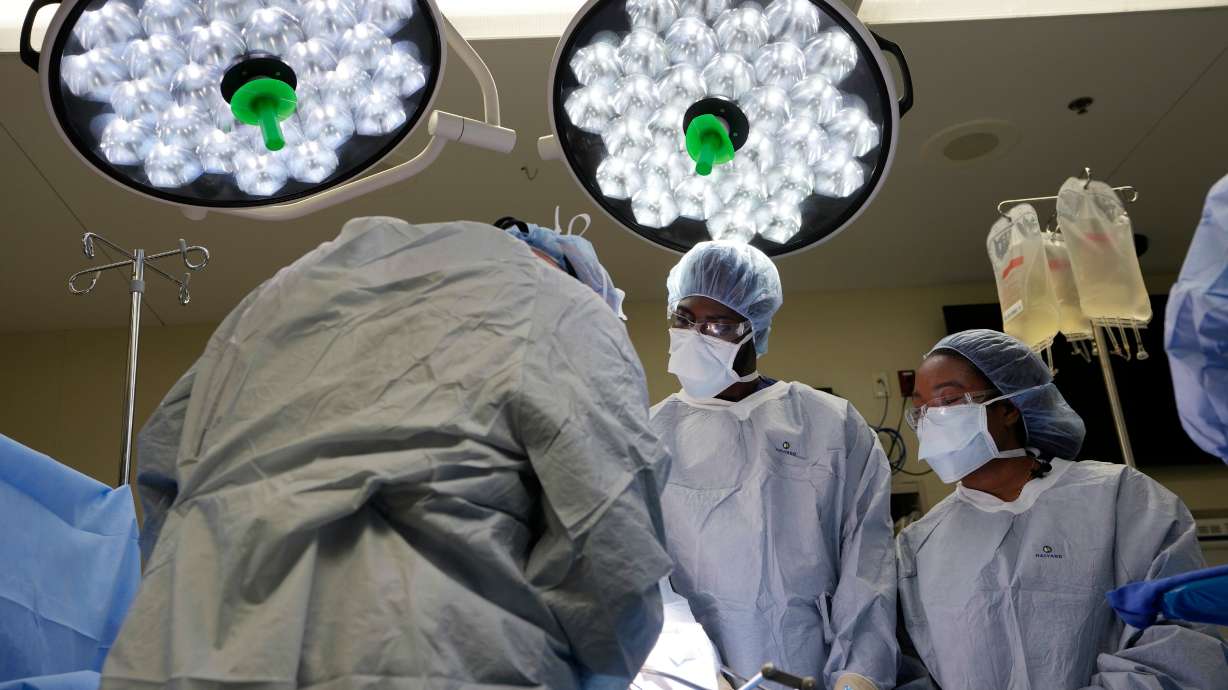Estimated read time: 4-5 minutes
This archived news story is available only for your personal, non-commercial use. Information in the story may be outdated or superseded by additional information. Reading or replaying the story in its archived form does not constitute a republication of the story.
SALT LAKE CITY — The field of medical ethics is grappling with use of a relatively new technique that's expected to boost the supply of donated organs and improve the likelihood a transplanted organ will do well in its recipient.
The procedure is called normothermic regional perfusion. The Organ Procurement and Transplantation Network said it's an organ-recovery procedure that's only used if an organ donor has been declared dead by circulatory criteria, meaning the heart no longer circulates blood and respiration has stopped. After a waiting period to ensure the heart doesn't voluntarily restart, blood vessels are clamped to ensure blood doesn't flow to the brain, then a machine is used to restart blood flow through the potential donor's organs.
The question at the center of the quandary, as the Pinnacle Gazette by Evrim Agaci puts it, is: "Does NRP invalidate the circulatory criteria for death, effectively resuscitating the donor?"
It's not a simple question for many people in the health care field. The American College of Physicians in 2021 issued a statement noting strong support for organ donation and transplantation, but concern about the ethics of the procedure.
Meanwhile, many health professionals see it as valid and valuable tool to boost availability and viability of organs that might otherwise not make the cut. It saves lives, they say.
There are two types of death declarations by medical professionals when it comes to organ donation.
"Organ donation occurs after circulatory determination of death, defined as death confirmed by the irreversible cessation of circulatory and respiratory functions, or after determination of brain death, defined as the irreversible loss of all brain functions, including the brain stem," the American College of Physicians wrote in its exploration of the issue.
The statement notes that organ donation after brain death has been considered generally better for transplant success because organs aren't affected by loss of blood prior to being removed, though both forms can save lives. With circulatory death, hearts and intestines are used less often because of damage.
A Michigan Medicine article at the University of Michigan said 30% to 40% of potential donor hearts aren't considered for transplant because they weren't functioning well enough to be transplanted in cases where circulatory death occurred.
Some other countries have been earlier adopters of the procedure, which restores limited oxygenation and blood circulation. The crux of the dilemma in the U.S.: The heart may start beating again. As the American College of Physicians noted, "Thus the determination of irreversibility — necessary for the certification of death of the patient made moments before — was apparently inaccurate since circulation is restored."
The patient is still dead; the brain has stopped functioning and meets brain death criteria, "due to the actions taken by the physicians procuring the organs," the statement says. "It is more accurately described as organ retrieval after cardiopulmonary arrest and the induction of brain death. The manner and declaration of death raise significant ethical questions and concerns."
The group's statement asks, "Is declaring a patient dead by irreversible circulatory criteria, then rendering the patient brain dead before restoring circulation honest, transparent and respectful of patient autonomy and dignity?"
Experts disagree.
Transplant by the numbers
According to the United Network for Organ Sharing, more than 16,000 deceased individuals were organ donors, which was a new annual record in the U.S. That same year, there were more than 46,000 organ transplants — also a record — including a historic 10,000 liver transplants and 3,000 lung transplants. Records were also set for kidney and heart transplants.
Many people still die as their diseased organs fail while they wait for a transplant. Organdonor.gov notes that 103,223 women, men and children are on waiting lists for a transplant at the moment and a new individual is added in the U.S. every eight minutes. Seventeen die each day. An organ donor has the potential to save eight lives and enhance dozens more through non-organ donation, including corneas and skin.
The site reports that 86% of those listed need a kidney, 10% a liver, 3% a heart and 1% each a pancreas or lung. Fewer than 1% are waiting for kidney/pancreas and allograft transplants, which include face, hands and the abdominal wall.
A University of Michigan Health team has experimented for several years with finding better ways to transport hearts so that they can be transplanted. Led by Dr. Alvaro Rojas-Pena, a research investigator in transplantation surgery, they've started using a "modified" normothermic perfusion system that makes transplant feasible for up to 24 hours, per the Michigan Medicine article.
"The system uses a blood-derived solution to perfuse the organs and has a hemofilter to remove toxins," the article said. It also lets the surgical team see how well the organ functions before transplant. "This research and current data prove the concept that normothermic perfusion has the potential to increase the organ pool by considering previously discarded hearts, performing an objective assessment of heart function," among other benefits.
In March 2023, the Alliance National Critical Issues Forum and the Gift of Life Institute co-hosted a gathering in Philadelphia for an "objective and unbiased" presentation of challenges and opportunities of normothermic regional perfusion. Alliance News reported much of the discussion centered on legal and ethical issues.










